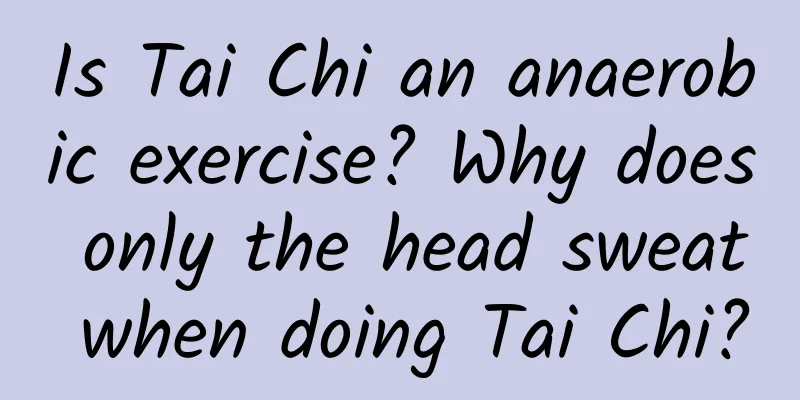Is Tai Chi an anaerobic exercise? Why does only the head sweat when doing Tai Chi?

|
Tai Chi, a world-class intangible cultural heritage, is based on the core ideas of Tai Chi and Yin-Yang dialectics in traditional Chinese Confucian and Taoist philosophy. It integrates multiple functions such as nourishing temperament, strengthening the body, and fighting. It combines the changes of Yin-Yang and Five Elements in Yixue, Chinese medicine meridians, ancient Daoyin and breathing techniques to form a traditional Chinese boxing that is both internal and external, gentle, slow, light, and hard and soft. So, is Tai Chi an anaerobic exercise? Why does only the head sweat when doing Tai Chi? Let's take a look at the introduction of Encyclopedia Knowledge Network to answer these questions! Contents of this article 1. Is Tai Chi an anaerobic exercise? 2. Why does only the head sweat when practicing Tai Chi? 3. The role of Tai Chi 1Is Tai Chi an anaerobic exercise?Tai Chi is not an anaerobic exercise, but a typical aerobic exercise. Tai Chi has slow movements, low intensity, rhythmic movements, and can be practiced for a long time without interruption. During the entire practice process, oxygen is fully supplied and aerobic metabolism dominates the body, so Tai Chi is an aerobic exercise. 2Why does only the head sweat when doing Tai Chi?Sweating on the head is related to Yin deficiency or Yang deficiency, Qi deficiency, etc. For some people, it is related to damp heat or liver heat, autonomic nervous system disorder, calcium deficiency, tuberculosis, hyperthyroidism, etc. It can be treated with Chinese medicine in combination with TCM syndrome differentiation. Sweating limited to the head is mostly caused by pathogenic heat in the upper Jiao, or damp heat in the middle Jiao, and is often caused by Yangming fever and damp heat. If it is after a serious illness, or the elderly are short of breath and sweat on the forehead, it is mostly a deficiency syndrome. If the forehead sweats suddenly at the end of a serious illness, it is a dangerous sign of deficiency Yin rising, Yin deficiency cannot attach to Yang, and Yin fluid is lost with Qi. 3The role of Tai ChiImprove the nervous system The function of the nervous system is to regulate the functional activities of various organs throughout the body, maintain the integrity and unity of the human body, and adapt to the changing needs of the external environment. Tai Chi promotes the improvement of brain nerve cells' functions through the coordination of thoughts, breathing and movements, and coordinates the excitation and inhibition processes of the human nervous system. It has a good preventive and therapeutic effect on mental trauma and neurological diseases such as neurasthenia, insomnia and hypertension. Enhance heart function, improve circulatory system, and expand lung capacity Heart disease is the world's number one killer. Currently, Western medicine has no specific treatment for this disease. Practicing Tai Chi can prevent heart disease because Tai Chi is different from other sports. Its movements are slow and stretching, relaxing the muscles of the whole body, so that the heart gets adequate blood supply, but it does not speed up the heart rate and increase the burden on the heart. Tai Chi uses slow, slender and even abdominal breathing to replenish the human lungs with oxygen, exercise the gastrointestinal peristalsis, and enhance the digestion and excretion functions. Therefore, regular Tai Chi practice can prevent and treat heart disease, lung disease, stomach disease, constipation, hemorrhoids, etc. Improve people's balance ability and prevent osteoporosis One of the common accidents among the elderly is losing balance and falling, resulting in a femoral neck fracture. Why does this happen? This is because the elderly have a decrease in bone calcium, resulting in osteoporosis. In Tai Chi, there are some movements that are specifically designed to train balance, so the balance of the practitioner is fully exercised. When practicing Tai Chi, one leg often supports the weight of the whole body, which increases the force on the leg and the calcium content in the bones, making the bones stronger. Therefore, people who practice Tai Chi regularly are less likely to fall or have fractures. Has bodybuilding effects Tai Chi's body posture requirements such as hanging the head, sinking shoulders and elbows, tucking the chest and pulling the back, relaxing the abdomen and opening the hips, and tucking the buttocks, plus the rotation of the waist during practice, allow the practitioner's entire body muscles to be fully exercised and maintain a good body shape. |
<<: What are the characteristics of Tai Chi? Can practicing Tai Chi help you grow taller?
Recommend
Non-surgical treatment of uterine fibroids
What are the non-surgical treatments for uterine ...
Sea salt, iodized salt, low sodium salt...how to choose among different types of salt?
When you go to the supermarket to buy salt, you w...
What are the early symptoms of metritis?
The uterus is a major organ in the female body an...
What should girls do to prepare for their first time?
Every woman will experience her first night, but ...
Is cervical laser surgery painful?
Cervical laser surgery will cause a little pain, ...
Angry during early pregnancy
Women should not get angry often during pregnancy...
Why is my vulva so itchy?
The private parts are the female reproductive org...
What time does Guyu fall in 2020? What do people do during Guyu?
Grain Rain is one of the 24 traditional solar ter...
Can pregnant women use a hair dryer to dry their hair?
Radiation exists everywhere in today's societ...
How much does abortion affect hormones?
Impact 1: Irregular menstruation, infertility Nor...
How to treat uterine amenorrhea
Amenorrhea is a common gynecological disease in w...
Amniotic fluid infusion has effect after a few days
Every pregnant woman needs to be aware of the hug...
How long after induced abortion can cervical erosion be treated?
Pregnancy is the happiest thing for every married...
Does TCT examination hurt?
TCT examination is a very good examination method...



![[Medical Q&A] What should I do if my child’s parotid glands swell due to mumps?](/upload/images/67f0f9b45433a.webp)





